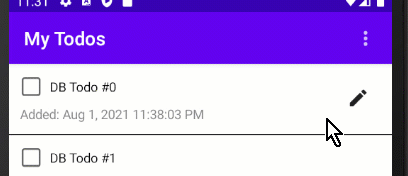I have 2 screens which both have their own Scaffold and TopAppBar. When I navigate between them using the Jetpack Navigation Compose library, the app bar flashes. Why does it happen and how can I get rid of this?
Code:
Navigation:
@Composable
fun TodoNavHost(
navController: NavHostController,
modifier: Modifier = Modifier
) {
NavHost(
navController = navController,
startDestination = TodoScreen.TodoList.name,
modifier = modifier
) {
composable(TodoScreen.TodoList.name) {
TodoListScreen(
onTodoEditClicked = { todo ->
navController.navigate("${TodoScreen.AddEditTodo.name}?todoId=${todo.id}")
},
onFabAddNewTodoClicked = {
navController.navigate(TodoScreen.AddEditTodo.name)
}
)
}
composable(
"${TodoScreen.AddEditTodo.name}?todoId={todoId}",
arguments = listOf(
navArgument("todoId") {
type = NavType.LongType
defaultValue = -1L
}
)
) {
AddEditTodoScreen(
onNavigateUp = {
navController.popBackStack()
},
onNavigateBackWithResult = { result ->
navController.navigate(TodoScreen.TodoList.name)
}
)
}
}
}
Todo list screen Scaffold with TopAppBar:
@Composable
fun TodoListBody(
todos: List<Todo>,
todoExpandedStates: Map<Long, Boolean>,
onTodoItemClicked: (Todo) -> Unit,
onTodoCheckedChanged: (Todo, Boolean) -> Unit,
onTodoEditClicked: (Todo) -> Unit,
onFabAddNewTodoClicked: () -> Unit,
onDeleteAllCompletedConfirmed: () -> Unit,
modifier: Modifier = Modifier,
errorSnackbarMessage: String = "",
errorSnackbarShown: Boolean = false
) {
var menuExpanded by remember { mutableStateOf(false) }
var showDeleteAllCompletedConfirmationDialog by rememberSaveable { mutableStateOf(false) }
Scaffold(
modifier,
topBar = {
TopAppBar(
title = { Text("My Todos") },
actions = {
IconButton(
onClick = { menuExpanded = !menuExpanded },
modifier = Modifier.semantics {
contentDescription = "Options Menu"
}
) {
Icon(Icons.Default.MoreVert, contentDescription = "Show menu")
}
DropdownMenu(
expanded = menuExpanded,
onDismissRequest = { menuExpanded = false }) {
DropdownMenuItem(
onClick = {
showDeleteAllCompletedConfirmationDialog = true
menuExpanded = false
},
modifier = Modifier.semantics {
contentDescription = "Option Delete All Completed"
}) {
Text("Delete all completed")
}
}
}
)
},
[...]
Add/edit screen Scaffold with TopAppBar:
@Composable
fun AddEditTodoBody(
todo: Todo?,
todoTitle: String,
setTitle: (String) -> Unit,
todoImportance: Boolean,
setImportance: (Boolean) -> Unit,
onSaveClick: () -> Unit,
onNavigateUp: () -> Unit,
modifier: Modifier = Modifier
) {
Scaffold(
modifier,
topBar = {
TopAppBar(
title = { Text(todo?.let { "Edit Todo" } ?: "Add Todo") },
actions = {
IconButton(onClick = onSaveClick) {
Icon(Icons.Default.Save, contentDescription = "Save Todo")
}
},
navigationIcon = {
IconButton(onClick = onNavigateUp) {
Icon(Icons.Default.ArrowBack, contentDescription = "Back")
}
}
)
},
) { innerPadding ->
BodyContent(
todoTitle = todoTitle,
setTitle = setTitle,
todoImportance = todoImportance,
setImportance = setImportance,
modifier = Modifier.padding(innerPadding)
)
}
}

